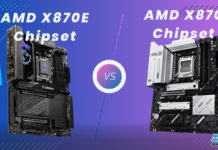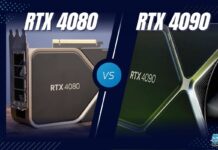The Ryzen 7 5800X3D held its ground as the best CPU for gaming since its launch, but now, with the introduction of the Ryzen 7 7800X3D, its reign has ended. In this comparison, we will be pinning the Ryzen 7 7800X3D vs Core i5-13600KF to see how much better AMD’s top tier is than Intel’s midrange, if better at all.
Key Takeaways
- The Ryzen 7 7800X3D had about 8.9% better gaming performance than the Intel i5 13600KF during our benchmarking.
- Furthermore, as we tested the processors further, we found AMD also had a massive advantage over Intel, with a little over 40% better power draw.
- Moreover, we examined the temperatures on both these CPUs were almost identical.
- Lastly, as per our research, the Ryzen 7 7800X3D costs about $449, whereas the i5-13600KF is much cheaper at about $320.
Comparison Table
| Feature | Core i5-13600KF | Ryzen 7 7800X3D |
| Architecture | Core i5 | Zen 4 |
| Codename | Raptor Lake-S | Raphael |
| CPU Socket | Intel Socket 1700 | AMD Socket AM5 |
| Unlocked for Overclocking | Yes | No |
| Max. Operating Temperature | 100°C | 89°C |
| Die Size | 257 mm² | 71 mm² |
| L1 Cache | 80K (per core) | 64K (per core) |
| L2 Cache | 2MB (per core) | 1MB (per core) |
| L3 Cache | 24 MB (shared) | 96MB (shared) |
| PCIe Express Version | Gen 5 | Gen 5 |
| Memory Type & Speed | DDR4, Up to 3200 MHz DDR5, Up to 5600 MHz |
DDR4, Up to 5200 MHz |
| Release Date | Sep 27th, 2022 | Jan 4th, 2023 |
| MSRP | 294 USD | 449 USD |
| Best Motherboard | BEST Motherboards For i5-13600KF | Best Motherboard For Ryzen 7 7800X3D |
| Best Coolers | BEST CPU Coolers For Ryzen 7 7800X3D | |
| Best GPU | Best GPU For Ryzen 7 7800X3D |
Architectural Difference
- Process Node: The Core i5-13600KF is manufactured on Intel’s 10nm process node, whereas the Ryzen 7 7800X3D is built on the 5nm TSMC process node. The smaller process node can potentially offer improved performance.
- Frequency: The Core i5-13600KF has a base frequency of 3.5 GHz and can reach up to 5.1 GHz in turbo mode. On the other hand, the Ryzen 7 7800X3D features a base frequency of 4.2 GHz and a turbo clock speed of up to 5 GHz. Higher clock speeds can lead to better single-threaded performance.
- TDP: The Core i5-13600KF has a TDP of 125W, while the Ryzen 7 7800X3D has a slightly lower TDP of 120W. Lower TDP values often indicate better power efficiency and potentially cooler operation.
- Cores & Threads: The Core i5-13600KF is equipped with 14 cores and 20 threads, providing significant multi-threaded performance potential. In contrast, the Ryzen 7 7800X3D features 8 cores and 16 threads, which may impact its multi-threaded performance compared to the Intel counterpart.
- Supported Technologies: The Core i5-13600KF comes with UHD Graphics 770 as its integrated graphics solution, whereas the Ryzen 7 7800X3D incorporates Radeon Graphics.
Gaming Tests
In this comparison section, we will pin the Ryzen 7800X3D vs i5-13600KF in gaming workloads to see which CPU is top in overall gaming prowess. All these tests have been performed on a testbench, the specifications of which are as follows:
- OS – Windows 11
- CPU Cooler – Cooler Master MasterLiquid Lite ML240L RGB
- SSD – XPG Gammix S70 Blade 2TB NVMe
- Power Supply – ENERMAX REVOLUTION D.F. X 1050W
- Graphics Card – GeForce RTX 4090 24GB
All of our tests were done at 1080p with high settings.
Forza Horizon 5
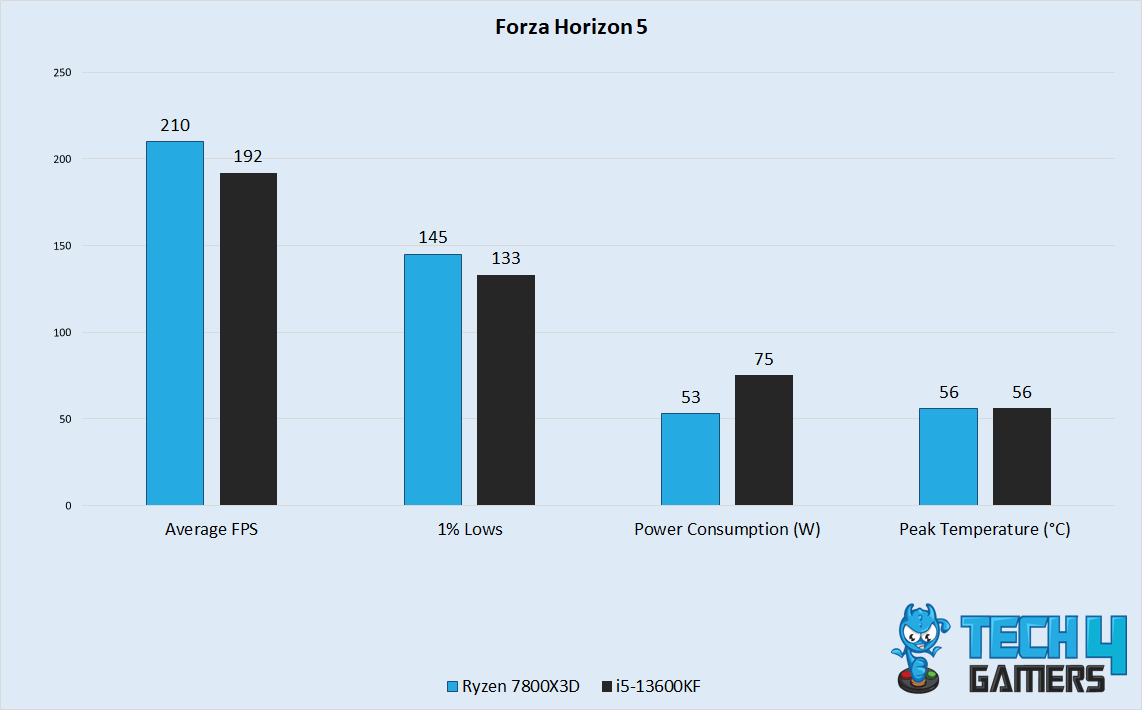
- In the first game of our tests, the Ryzen 7800X3D outperformed the 13600KF by outputting 210 FPS vs the i5’s 192 FPS.
- The 1% lows were similar, with the Ryzen having 145 FPS as its 1% lows and the i5 having 133 FPS.
- In regards to power, we saw Intel draw a much more significant amount. The Ryzen 7800X3D made do with 53 W, whereas the i5 13600KF utilized about 75 W.
- Peak temperatures were equivalent on both processors: 56°C.
Cyberpunk 2077
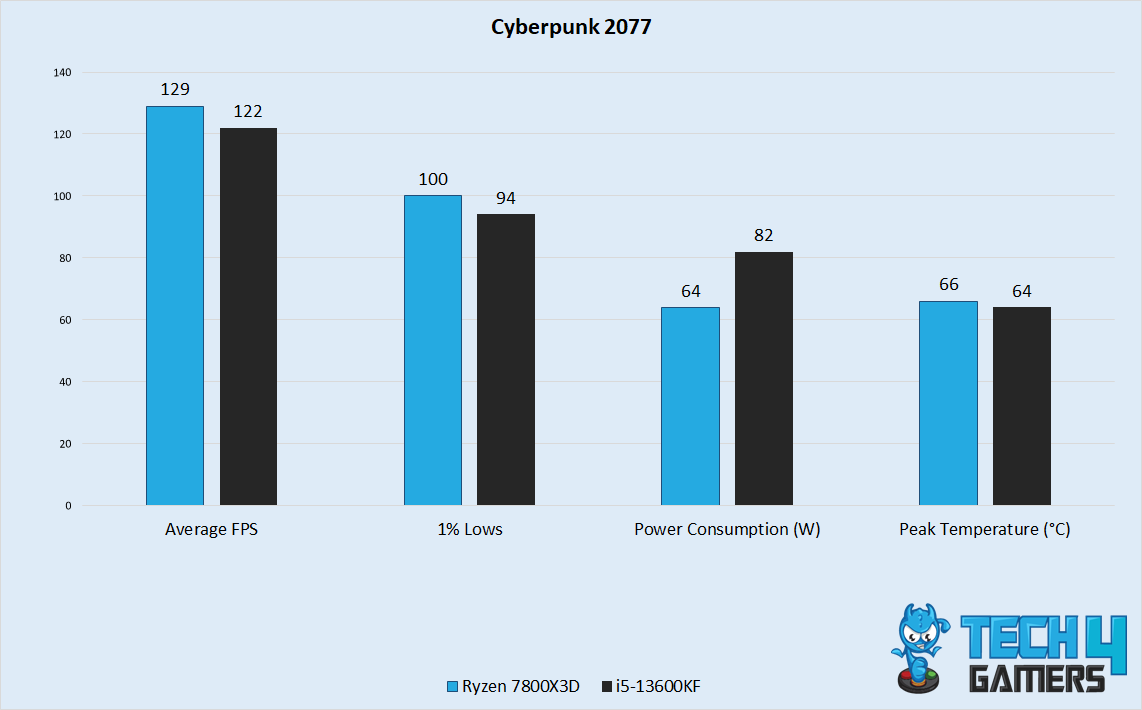
- This game, we had AMD outperforming Intel again, with the Ryzen 7 7800X3D having 129 FPS on average, whereas the i5-13600KF had about 122 FPS.
- The Ryzen 7 7800X3D had about 100 FPS in this game, whereas the i5 13600KF was not too far back with 94 FPS.
- Once again, the i5-13600KF drew much more power than the Ryzen 7 7800X3D. It drew about 82 W compared to the Ryzen’s 64 W.
- Surprisingly, we found the i5-13600KF was cooler than the Ryzen 7800X3D in this test, with a peak of 64°C compared to 66°C.
Hitman 3
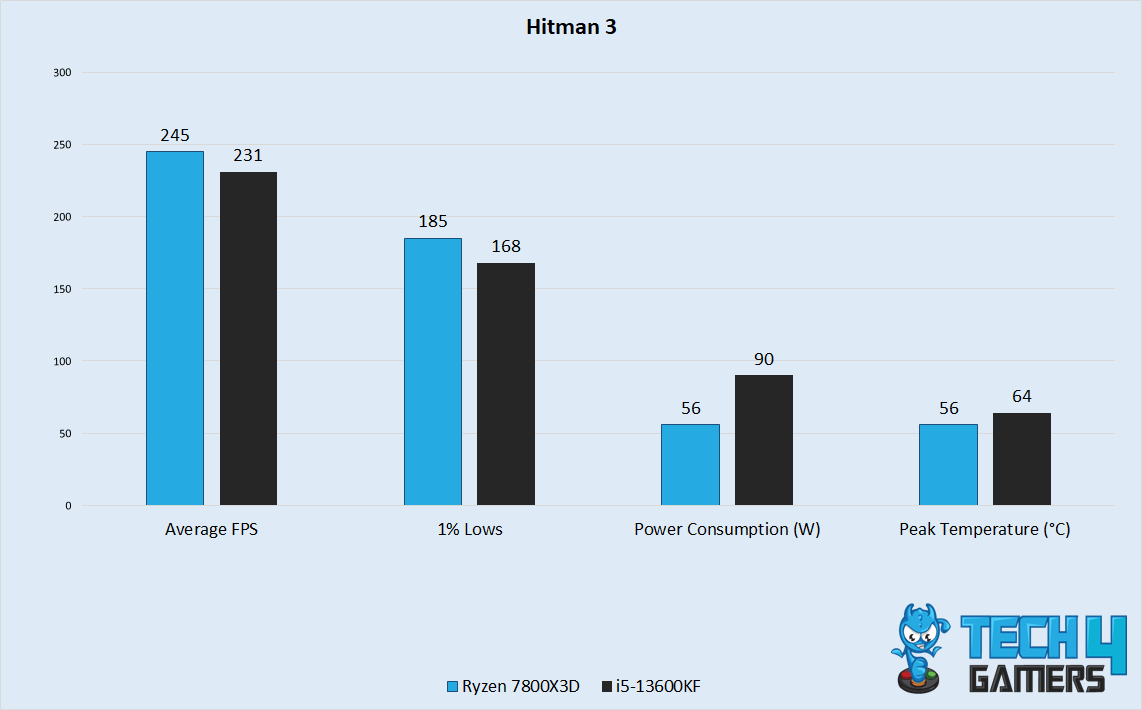
- In Hitman 3, we examined the Ryzen 7 7800X3D had an average of about 245 FPS, whereas the i5-13600KF had an average of 231 FPS.
- The 1% lows were again higher on the 7800X3D, 185 vs 168 on the i5 13600KF.
- Power draw was much stronger in our test than the other parameters. The i5-13600KF had a power draw of about 90 W, whereas the Ryzen 7 7800X3D had a power draw of 56 W.
- The temperatures were significantly higher on the i5 in this test, with a peak of 64°C, while the Ryzen 7 7800X3D stayed cool at about 56°C.
Microsoft Flight Simulator
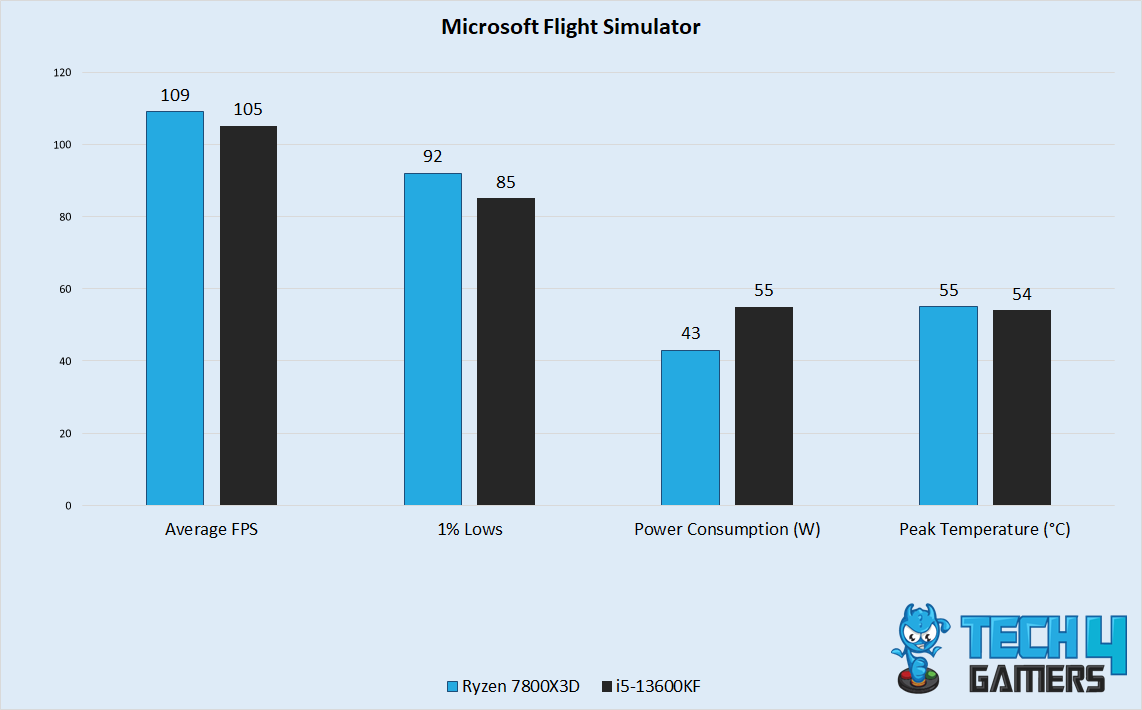
- Being a more GPU-bounded title, we found the Microsoft Flight Simulator acts like somewhat of an equalizer for the CPUs, with the i5-13600KF still getting slightly less FPS, 105, compared to the Ryzen’s 109.
- The Ryzen 7 7800X3D again had slightly better 1% lows, 92 FPS compared to the i5’s 85 FPS.
- Microsoft Flight Simulator raised the CPU temperature on the Ryzen 7 7800X3D to about 55°C, whereas the i5-13600KF was marginally cooler at about 54°C.
- While running this game, we examined the i5 used 55 W of power, whereas the Ryzen 7 consumed around 43 W.
Horizon Zero Dawn
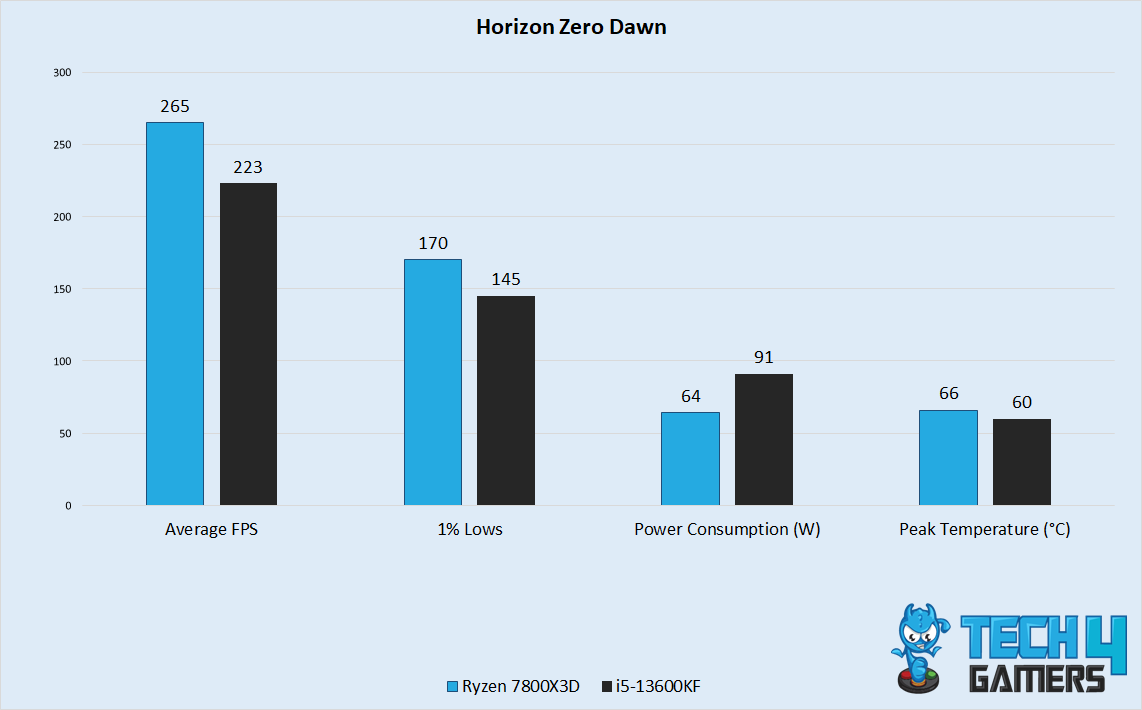
- The Ryzen averaged about 265 FPS in our testing, whereas the i5-13600KF reached 223 FPS.
- Looking at the 1% lows, we saw that the i5 had 145 FPS, whereas the Ryzen 7 had a 1% low of about 170 FPS.
- While running Horizon Zero Dawn, the Ryzen 7 7800X2D experienced a CPU temperature of around 66°C, whereas the i5 13600KF had a temperature of approximately 60°C.
- While we were playing Horizon Zero Dawn, the i5 utilized 91 W of power, while the Ryzen 7 drew approximately 64 W.
Overall Gaming Performance
Overall Framerate
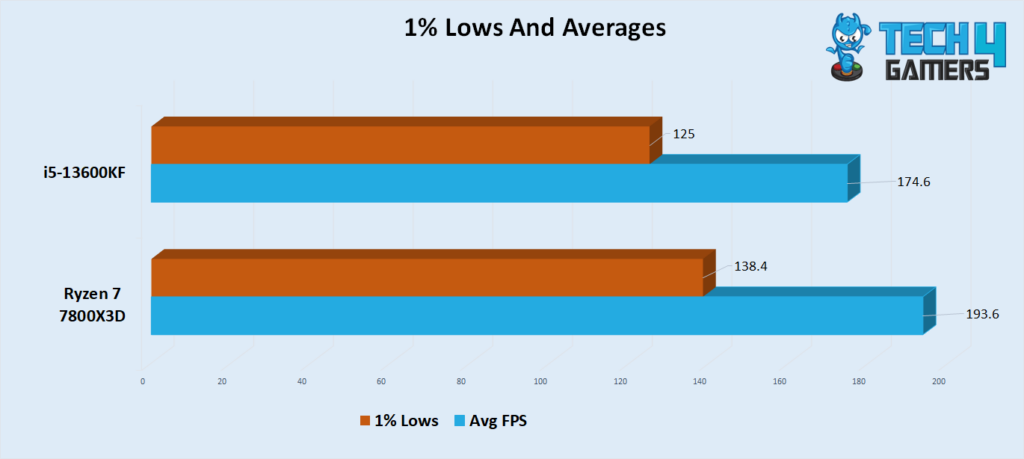
- In our tests, the Ryzen 7 7800X3D consistently outperformed the i5-13600KF in all 5 games. On average, the Ryzen 7 7800X3D achieved an impressive 8.9% higher framerate than the i5-13600KF.
- Moreover, the Ryzen 7 7800X3D outperformed the i5-13600KF in all 5 games tested, with an average 7.7% higher framerate in terms of 1% lows across all games.
Power Consumption
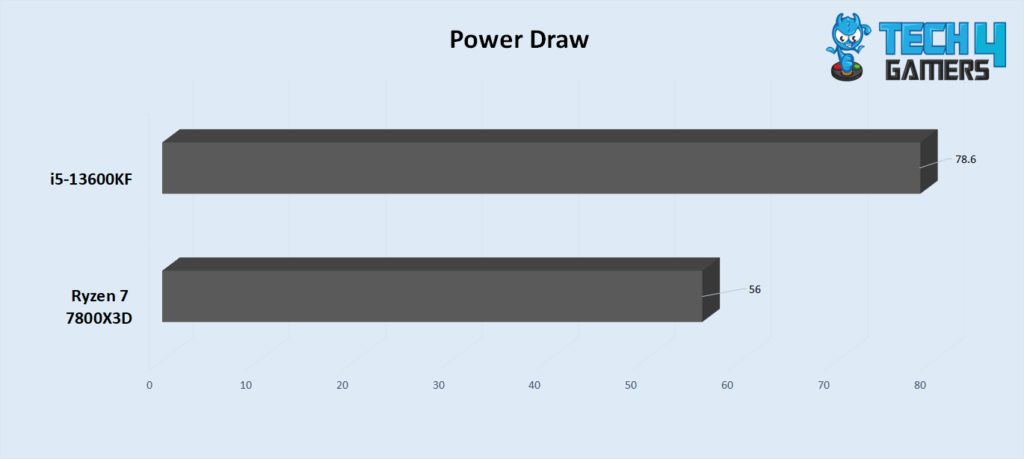
- During our testing, the i5-13600KF consistently consumed significantly more power than the Ryzen 7 7800X3D in all 5 games. On average, the i5-13600KF drew approximately 40.4% more power than the Ryzen 7 7800X3D across all games.
Thermals
- The peak temperatures for both processors were similar across all games tested, with the i5-13600KF having slightly higher temperatures in some games and the Ryzen 7 7800X3D having higher temperatures in others.
- On average, the peak temperatures for both processors were nearly identical across all games, with the i5-13600KF having an average peak temperature of 59.6°C and the Ryzen 7 7800X3D having an average peak temperature of 59.8°C.
Pricing And Availability
- According to our findings, the MSRP of the Ryzen 7 7800X3D is listed at about $449, while the i5-13600KF comes at a more budget-friendly price of about $285.
- This significant price difference of 44.6% might make the i5-13600KF an appealing choice for cost-conscious users or those looking for a more budget-friendly option.
- Moreover, both CPUs are expected to be readily available at a wide range of online and offline PC parts sellers. Given their anticipated popularity and demand, it’s likely that consumers will find them at their preferred PC hardware retailers.
What We Recommend
- The Ryzen 7 7800X3D would be our first recommendation as it consistently outperformed the i5-13600KF in all 5 games tested. On average, it achieved an impressive 8.9% higher framerate, providing a noticeably smoother gaming experience.
- Moreover, in our tests, the i5-13600KF consistently consumed significantly more power than the Ryzen 7 7800X3D. On average, the i5-13600KF drew approximately 40.4% more power, indicating that the Ryzen 7 7800X3D is the more power-efficient choice.
- The peak temperatures for both processors were nearly identical across all games tested. The i5-13600KF has an average peak temperature of 59.6°C, and the Ryzen 7 7800X3D has an average peak temperature of 59.8°C.
- With a significant price difference of 44.6%, the i5-13600KF emerges as a more budget-friendly option. This could be particularly attractive for cost-conscious users seeking a powerful CPU without breaking the bank.
Taking all these factors into account, we recommend the Ryzen 7 7800X3D for those who prioritize gaming performance and power efficiency, while the i5-13600KF is an excellent choice for those on a tighter budget without compromising too much on gaming capabilities.
Pros And Cons
|
Ryzen 7800X3D |
Core i5-13600KF |
||
|
Pros |
Cons | Pros |
Cons |
| The best CPU for PC gaming bar-none. | More Expensive than the i5-13600KF | A perfect option for gamers on a budget. | Not the most powerful CPU option for gaming. |
| Unmatched efficiency. | Sensitive to changes in voltages. | Modern architecture and backward compatibility. | Less power efficient than the Ryzen 7800X3D |
No, the Intel Core i5 13600KF does not have an iGPU, being an F series chip. The Ryzen Core i5 13600, however, does have an iGPU. No, the Ryzen 7 7800X3D gaming performance is much better than the i5, so much so that it currently has the title of the best gaming CPU under its belt. The Ryzen 7 7800X3D is about 8 months more recent the the i5 13600KF.Frequently Asked Questions
More From Ryzen 7 7800X3D:
More From Core i5-13600KF:
Thank you! Please share your positive feedback. 🔋
How could we improve this post? Please Help us. 😔
[Comparisons Expert]
Abdemanaf is a skilled creative writer who has been honing his craft since 2011. While initially working in different fields, he found a passion for technology and has been exploring the tech world since early 2015. Over the years, he has developed an in-depth knowledge of the latest tech trends and product offerings by various companies.
Abdemanaf’s writing reflects his analytical mindset and ability to think critically. He has a knack for breaking down complex technical information into easily digestible pieces, making his articles engaging and accessible to readers from all backgrounds. In February 2022, he joined Tech4Gamers as a blog and product comparison writer, where he has been able to hone his skills further.
As a writer, Abdemanaf is dedicated to staying up-to-date with the latest technological advancements and trends, enabling him to provide readers with the most relevant and accurate information. He is always eager to learn more and is constantly seeking new challenges to improve his skills.
Get In Touch: manaf@tech4gamers.com


 Threads
Threads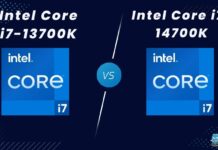
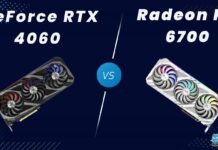
![RTX 2070 Vs RTX 3070 Ti [We Tested 8 Games]](https://tech4gamers.com/wp-content/uploads/2023/06/GPU-Comparison-Template-NEW-2-1-218x150.jpg)
